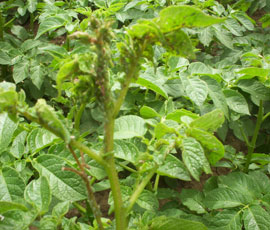Keep an eye out for neoniotinoid resistance

It is only a matter of time before neonicotinoid-resistant peach potato aphids reach UK shores from the Continent, warned Mark Stevens, lead scientist at the BBRO.
“Currently resistance to neonicotinoids has not been found in Myzus persicae in the UK, but with winds often coming from the South during the summer it is possible that the populations in France could make it into UK crops,” said Dr Stevens.
“I don’t want to be alarmist, but it is something we need to watch out for,” he added.
MACE and pyrethroid resistance is particularly high in peach potato aphids, leaving growers with very few alternatives when controlling such an important virus vector.
“About 95% of sugar beet seed is treated with a neonicotinoid and without that treatment we certainly would have had more beet mild yellowing virus epidemics since the introduction of those seed treatments in 1994,” Dr Stevens explained.
“Losing efficacy to resistance would be a huge concern and threaten the viability of the crop.”
Beet mild yellowing virus can cause up to 30% yield loss in sugar beet crops. In oilseed rape, turnip yellows virus – also carried by Myzus persicae – can reduce yield by 20-25% and is becoming an increasing problem in rape rotations.
“This highlights the importance of monitoring and we need to keep our eyes and ears open so we understand exactly what is happening in these populations regarding neonicotinoid resistance,” said Dr Stevens.
Neonicotinoids pose danger to bees, EFSA claims

